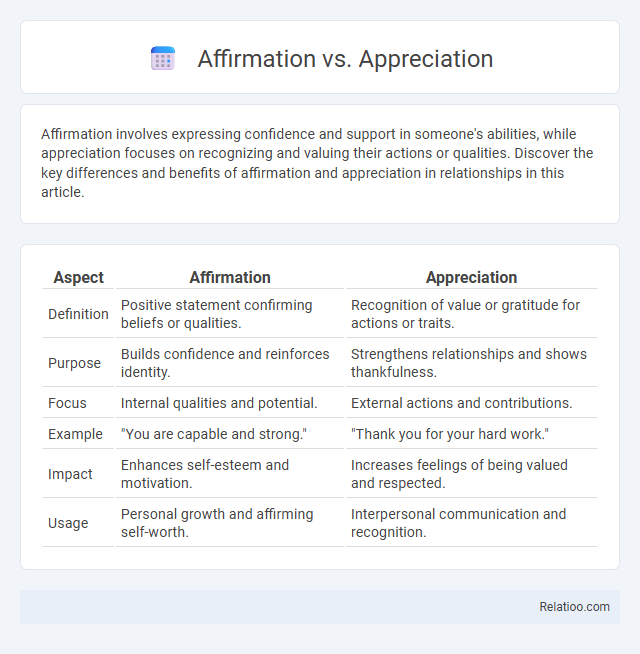Affirmation involves expressing confidence and support in someone's abilities, while appreciation focuses on recognizing and valuing their actions or qualities. Discover the key differences and benefits of affirmation and appreciation in relationships in this article.
Table of Comparison
| Aspect | Affirmation | Appreciation |
|---|---|---|
| Definition | Positive statement confirming beliefs or qualities. | Recognition of value or gratitude for actions or traits. |
| Purpose | Builds confidence and reinforces identity. | Strengthens relationships and shows thankfulness. |
| Focus | Internal qualities and potential. | External actions and contributions. |
| Example | "You are capable and strong." | "Thank you for your hard work." |
| Impact | Enhances self-esteem and motivation. | Increases feelings of being valued and respected. |
| Usage | Personal growth and affirming self-worth. | Interpersonal communication and recognition. |
Understanding Affirmation: Definition and Purpose
Understanding affirmation involves recognizing it as a positive statement that reinforces self-worth and confidence, serving to encourage and motivate personal growth. Affirmation differs from appreciation, which centers on expressing gratitude and recognizing value in others or situations, while affirmation focuses inward on your beliefs and mindset. Your consistent use of affirmations can reshape thought patterns and foster a stronger, more positive self-image.
What is Appreciation? Meaning and Importance
Appreciation is the recognition and expression of gratitude for someone's efforts, qualities, or achievements, which fosters positive relationships and boosts morale. It involves actively acknowledging value and contributions, thereby reinforcing motivation and emotional well-being. In contrast to affirmation, which confirms truth or validity, appreciation emphasizes gratitude and acknowledgment, highlighting its crucial role in personal and organizational growth.
Key Differences Between Affirmation and Appreciation
Affirmation involves expressing positive statements that reinforce self-belief or confidence, often focusing on internal thoughts and feelings. Appreciation, in contrast, emphasizes recognizing and valuing the efforts, qualities, or contributions of others, highlighting external acknowledgement. The key difference lies in affirmation being self-directed or internally focused, while appreciation is outwardly directed toward others, fostering gratitude and recognition.
Psychological Impact of Affirmation
Affirmation involves reinforcing positive beliefs about oneself, significantly boosting self-esteem and fostering resilience against stress, while appreciation emphasizes recognizing others' value, which enhances social bonding and emotional well-being. The psychological impact of affirmation is profound, as it helps rewire negative thought patterns and promotes a growth mindset, leading to increased motivation and emotional stability. In contrast to gratitude practices that focus outwardly, affirmations directly influence an individual's internal dialogue and self-perception, making them a powerful tool for mental health improvement.
The Emotional Power of Appreciation
Appreciation holds a unique emotional power by directly acknowledging and valuing someone's actions or qualities, fostering feelings of connection and self-worth. Unlike affirmation, which affirms a belief or truth about oneself, appreciation actively celebrates specific contributions or gestures, creating a tangible sense of gratitude and positivity. This emotional resonance strengthens relationships and motivates continued positive behavior more effectively than mere affirmation or recognition.
When to Use Affirmation vs Appreciation
Use affirmation to reinforce positive beliefs and self-worth by explicitly acknowledging qualities or achievements, helping to build confidence and motivation. Appreciation is best applied to express gratitude and recognize efforts or actions that contribute to relationships or outcomes, fostering goodwill and connection. Choose affirmation when the goal is to strengthen self-identity or mindset, and appreciation when aiming to honor contributions and encourage ongoing positive behavior.
Real-Life Examples: Affirmation and Appreciation in Action
Affirmation involves explicitly acknowledging someone's qualities or efforts, such as telling a colleague, "Your presentation clearly demonstrated your expertise." Appreciation goes beyond verbal recognition by expressing gratitude, like writing a thank-you note to a team member for their dedication and hard work. In real-life scenarios, combining affirmation and appreciation fosters a positive environment, for instance, praising an employee's creativity and simultaneously appreciating their contribution to the project's success.
Benefits of Practicing Both in Relationships
Practicing both affirmation and appreciation in relationships enhances emotional connection and builds trust by reinforcing positive behaviors and feelings. Affirmations provide clear, supportive messages that boost self-esteem, while appreciation acknowledges specific actions and qualities, fostering mutual respect and gratitude. Together, these practices create a balanced dynamic that encourages open communication and strengthens relationship satisfaction.
Common Misconceptions About Affirmation and Appreciation
Common misconceptions about affirmation and appreciation often confuse their purposes: affirmation is frequently mistaken for simple praise, but it specifically reinforces an individual's core qualities or values, while appreciation acknowledges specific actions or efforts. Many assume appreciation is less impactful than affirmation, yet both contribute uniquely to motivation and emotional well-being by addressing different emotional needs. Understanding these distinctions enhances effective communication and fosters deeper, more meaningful relationships.
Tips for Balancing Affirmation and Appreciation in Daily Life
Balancing affirmation and appreciation in daily life involves recognizing the distinct value each holds: affirmation reinforces your self-worth through positive validation, while appreciation expresses gratitude for others' contributions or qualities. You can maintain this balance by consistently acknowledging your own progress and successes, then intentionally offering genuine praise or thanks to those around you to strengthen relationships. Practicing mindfulness helps ensure your affirmations remain authentic and your appreciations are specific, fostering emotional well-being and social connection.

Infographic: Affirmation vs Appreciation
 relatioo.com
relatioo.com